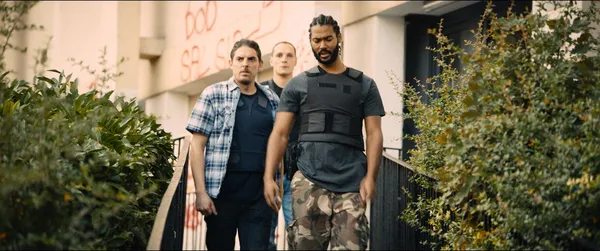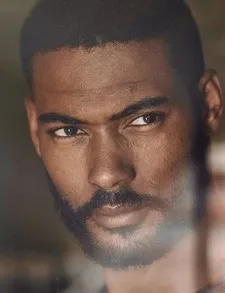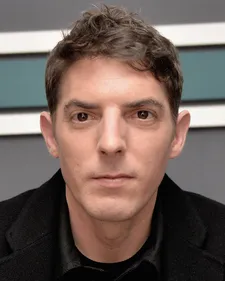 |
| On patrol - cops (from left) Damien Bonnard, Alexis Manenti and Djebril Zonga in Ladja Ly’s award-winning Les Misérables Photo: UniFrance |
A trio of remarkable and unconventional actors form the backbone of Ladj Ly’s first feature film Les Misérables (named after Victor Hugo’s classic novel set in the suburb of Montfermeil). Two of them, Djebril Zonga and Alexis Manenti, grew up like Ly in deprived circumstances in the area depicted in the film, while the third, Damien Bonnard, was the outsider. His character is a newcomer to the trio of cops.
 |
| Djebril Zonga: “We are speaking about people whom most of us would never know anything about …” Photo: UniFrance |
The film has had an incredible career from its bow at the Cannes Film Festival last year when it won the jury award, an Oscar nomination for best foreign film, then its success in winning no fewer than four César awards (the French Oscars) for Best Film, Best Newcomer (Alexis Manenti) and Best Editing (Flora Volpelière) plus the Audience Prize during a stormy ceremony culminating in a best director win for Roman Polanski (An Officer And A Spy). It was also named European Discovery in the European Awards, was nominated for a Golden Globe as well as an Independent Spirit Award and won best film, best director and best screenplay in France’s Lumière Awards.
Ly and his actors were astonished that a tale of racist police violence in Paris’s largely ethnic-minority banlieues, or suburbs, managed to find an audience at home and abroad. More than two million cinema tickets were sold in France alone, and the film is now being seen worldwide through Amazon Studios. Later this year it will be released on UK and Irish screens by Altitude Film Distributors.
Ly was raised by Malian immigrant parents in a crumbling high-rise block—around which Les Misérables is set. Hugo also used the location in the iconic 1862 novel, portraying local boy Gavroche as battling social marginalisation and poverty. The poverty rate in Montfermeil is around 30%, according to government statistics.
The director has said that every scene in the film was an experience he himself lived through. Some of his real-life experiences, including two years that he spent in prison a decade ago (on charges of kidnapping), have been left to the side. It was part of an involved family dispute about which he prefers not to elaborate.
 |
| Alexis Manenti: "“The way the director describes each character was crucial. It was important for him to work on the complexity and ambiguity of the characters …” |
When I talk to the three actors in Paris in January, Ly is absent in the States on pre-Oscar promotion. Zonga, an ex-model and a mate of Ly from Clichy-sous-Bois, is the most talkative of the bunch, who all met up initially on the short film which was the basis of the feature. “Alexis and Damien knew each other a bit … and I knew Alexis previously. What brought us together was the short film three years ago and then we came back together for the feature. We were practically living together while we were shooting both the short and the feature. So we built up some chemistry and each evening we would work our way through the script to make sure we made the best of it. I am not sure how much of a voice the film can give to the communities we describe but certainly it is raising their visibility. You do not usually see these kinds of people in French cinema but now there will be an awareness of them - and all over the world.”
The 1995 film La Haine, by Mathieu Kassovitz (who is white), on the same subject, is now regarded as a classic of French cinema. Are there any points of comparison?
Bonnard, who Ly described as being in a state of shock on visiting the suburbs for the first time, said “They are both very different films, although both take place in the suburbs. In this film the main protagonists are the police whereas in La Haine it was the youngsters. In many ways I would say the situation in these areas has got worse and is much more violent now than it was then in 1995.”
Zonga concurred. “It is an important film because we are speaking about people whom most of us would never knows anything about. They have been abandoned by the Government and society at large. It is also talking about youth and the future. It has a universal theme to it - you can find the same problems in Africa or America and Asia. We certainly hope the film is a force for change but I am not sure the film in itself can change things. At least it is a starting point for discussion, especially in our country.”
 |
| Damien Bonnard: "I would say the situation in these areas has got worse and is much more violent now than it was …” Photo: UniFrance |
All the actors worked with local law enforcement teams before the shoot. Manenti who plays the nasty racist cop, said that the cops were much part of the community. “The way the director describes each character was crucial. It was important for him to work on the complexity and ambiguity of the characters. And also to play with the stereotypes such as the bad cop or the racist cop and to try and question all these things and to bring some context at the end.”
Zonga added that the cops are almost more part of the community than the people who are living there. “The people go away to work and come back, whereas the cops are living there all the time and also working on the spot incessantly too.”
They all agreed that the authenticity of the director’s background made the film more than just a routine police thriller or exposé. Zonga, speaking for them all, suggested “The difference here is that the film is directed by someone from this area who knows exactly what he is talking about. It is not just a police movie. Ly has a lot of ideas for his next film, but at the moment he is concentrating on promoting this one. Of course the Americans want to work with him but I know he wants to stay in France and make exactly the kind of films he wants to do. The reaction from the public has been positive - and it has been from all kinds of different age groups, genders and backgrounds. And young people can relate to the people in the film.”
There was talk at one stage that President Emmanuel Macron requested Ly to attend a private screening at the Elysée Ly, in typically gung-ho fashion, thought it might be more appropriate that the President come to a screening in the area where it was shot. Security officials vetoed the idea but Macron was sent a DVD to watch after which he confessed to one newspaper that he had been “deeply moved.” He issued instructions for plans to improve the situation in such areas to be accelerated.
Whether such well-intentioned words effect a difference only time will tell but Ly and his actors will be keeping a close watch.
Les Misérables will be released in UK and Ireland later in the year. Richard Mowe talked to the actors from Les Misérables at the Rendezvous with French Cinema in Paris in January.





















